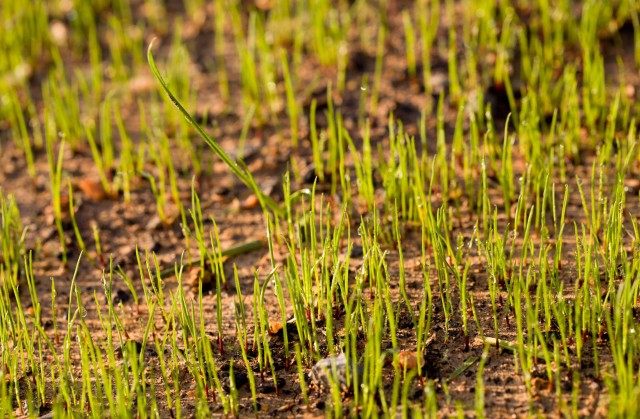 In North Alabama, there are both warm season and cool season grasses that grow in the transition zone. The U.S. has a region known to the turf industry as the transition zone that extends through the central part of the country and includes parts of each of the other four zones. This is the most difficult region in which to grow grass. Both cool-season and warm-season turfgrasses are present in this area, although few turfgrass species are well adapted to this challenging climate. While neither warm season or cool season grasses flourish in the transition zone, they both have advantages and disadvantages. Warm season grasses like Bermuda and Zoysia do not need re-seeding because they spread on their own by rhizomes and stolons. Cool season grasses, like Rye grass and Fescue, will need to be overseeded every year to maintain a thick, lush lawn.
In North Alabama, there are both warm season and cool season grasses that grow in the transition zone. The U.S. has a region known to the turf industry as the transition zone that extends through the central part of the country and includes parts of each of the other four zones. This is the most difficult region in which to grow grass. Both cool-season and warm-season turfgrasses are present in this area, although few turfgrass species are well adapted to this challenging climate. While neither warm season or cool season grasses flourish in the transition zone, they both have advantages and disadvantages. Warm season grasses like Bermuda and Zoysia do not need re-seeding because they spread on their own by rhizomes and stolons. Cool season grasses, like Rye grass and Fescue, will need to be overseeded every year to maintain a thick, lush lawn.
For cool season grasses, overseeding in late summer or early fall gives seedlings the best chance of achieving maturity. It is beneficial to get the seeds to germinate and grow before leaves start to fall from the trees. It is also important to keep leaves from lying on the new seedlings for more than a couple of days. An abundance of leaves that remain on your seedlings for too long can cause a decline in the maturation, and/or lead to eventual death. When planted in late summer or early fall, grasses have two ideal growing seasons to mature before issues brought on by summer temperatures and humidity start to cause a decline in aesthetics. Mature grass plants tend to handle extreme conditions better than newly planted or immature seedlings.
Choosing The Right Seed
Seed blends come in many different options. Choosing a blend for your lawn’s conditions will work best. For instance, extremely shady lawns benefit more from using shade blends of seeds, while full-sun lawns may benefit more from blends with drought or disease-resistant seeds. Besides the timing of when to overseed, choosing the best seed blend for your lawn’s conditions is possibly the second most important decision to be made concerning overseeding your lawn. Proper watering and mowing practices are other factors to consider before investing in overseeding your lawn. If you are not able to keep the lawn properly watered and mowed, then the expense of overseeding may not provide the desired results that you are trying to achieve. Proper fertilization is equally important to achieve a reduction of weed infestations. Preventing weeds from infesting your lawn will give the new seedlings the best chance of survival and maturation because your seedlings will utilize the water and nutrients, rather than the weeds. In most cases, it is easier and less expensive to have professionals perform overseeding, fertilization, and weed control applications, and with TDI, you get guaranteed results backed up with FREE service calls.
Call the professionals at TDI Services if you have any questions or are interested in any of the services that we offer including overseeding.
